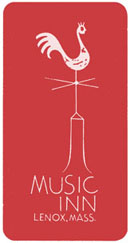
The Founders
Stephanie Barber and her husband Philip were both public relations professionals when they left Manhattan and moved to the Berkshires. Philip was drawn to Berkshire County, where his ancestors had been noted farmers before they moved to Iowa. An aspiring playwright, he had studied alongside Thomas Wolfe in George Pierce Baker's famous '47 Workshop, had taught drama at Yale, and had succeeded Elmer Rice as head of the Federal Theatre in New York City before he co-founded his PR firm. Stephanie Frey Barber was an eminently successful fashion journalist before joining Philip's public relations firm; she was noted for her distinctive clothing, especially her hats--a new one delivered to her daily by an enterprising designer. An Associated Press headline from 1950 noted her departure from the fashion scene: “Sophisticate Abandons New York to be a Cowgirl.”
When the Barbers purchased the collection of stables and barns, on the grounds of the Countess de Heredia's Wheatleigh Estate (est. 1897), then owned by the Boston Symphony Orchestra, they could have opened a traditional inn, catering to guests who came to hear classical music at Tanglewood. They could have settled comfortably into country living. They were in the very heart of Norman Rockwell country. But the Barbers were knowledgeable lovers of jazz, with friends like Alan Lomax, the poet Langston Hughes, Philip's cousin Meredith Willson (of Music Man fame), and Professor Marshall Stearns, who was forming his Institute of Jazz Studies. So, instead, they created something new, a Music Inn, which united musicians and music lovers in debate and camaraderie.
Stephanie was the grand mistress of ceremonies at Music Inn while Philip commuted to his PR firm during the week. Her warm and nurturing spirit left lasting memories in the minds and hearts of guests and famous performers alike. Against a backdrop of the politically turbulent and racially divided 1950s, Stephanie created a kind of Utopia separate from the outside world. At her Music Inn, blacks and whites shared rooms side-by-side, and political persuasion didn't matter. When a New York Times photographer wished to remove Pete Seeger from a group photo because some people thought he was a communist, Stephanie forthrightly responded, "He stays in the shot or there is no picture.”
With such purity of spirit and unflappable integrity, Stephanie hosted a venue that catalyzed groundbreaking ideas and interactions. Music was the elixir and the element that bonded the participants for life. As Stephanie put it, "They deeply understood each other whether they were from Brooklyn or Nigeria. It was astonishing."
Philip Barber died in 1980 in Becket, MA where he had retired and founded the Becket Arts Center, which honors his name. Stephanie became mistress of Wheatleigh and reared two sons there until its sale in 1976. Stephanie passed away on August 26th, 2003 at the age of 84 leaving behind her 2nd husband, professor Arthur Collins, two sons, three stepsons, three stepdaughters, fifteen grandchildren and one great-grandchild.

